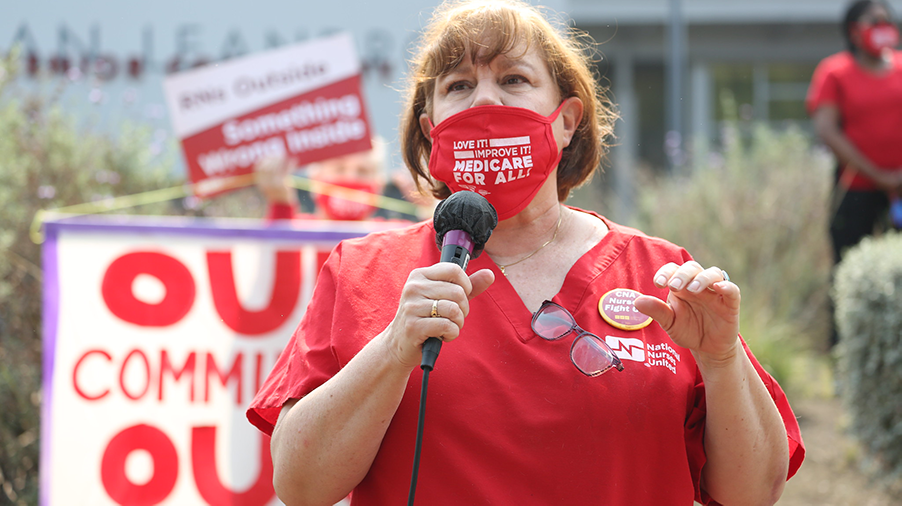Press Release
Nurses Warn CA Hospital Industry Demands For Patient Safety Cuts Would Worsen Pandemic

The California Nurses Association/National Nurses United today criticized the California hospital industry for years of hospital closures and other cuts that have led to the current crises in capacity and staffing. The union also criticized the industry for making new demands for sweeping blanket waivers to roll back years of workplace public safety rules that they warn would worsen the severity of the pandemic.
Since 2000, there have been at least 50 hospital closures in California, including recent hospital and emergency rooms closures in Los Angeles, Long Beach, the Bay Area, and in rural communities, along with cuts in “less profitable” patient services.
“And now we are paying the price of these shortsighted, profit-driven schemes in a public health disaster with overwhelmed hospitals, unprotected staff, and dangerously short staffing,” said CNA/NNU Executive Director Bonnie Castillo, RN.
In recent interviews, Carmela Coyle, president/CEO of the California Hospital Association, the industry trade lobby, defended the profit-focused goals due to “a lot of pressure on making health care more affordable” and questioning “should we invest in additional capacity” that will “add to the cost of the health care system” even though “just-in-time does not work during a pandemic.”
Yet, Castillo noted, “it was exactly ‘just-in-time’ practices sold by management consultants, that slashed preparedness in staffing, supplies, and other safety protocols. They treat safe staffing and needed supplies as a drag on budget goals and profit margins, rather than the pre-requisite for a humane, fully prepared patient-oriented health care system.”
“It is the same industry that now wants to further erode life-saving protections by pushing the state and the governor for a blanket waiver in safe staffing requirements that will directly affect safe patient care, above over 200 individual ratio waivers already approved,” said CNA Legislative Director Stephanie Roberson. “Blanket waivers will only create further stress, and fatigue for nurses who have been putting their health, safety and lives on the line for nine months.”
And, “making demands for rollback in public protections,” notes Castillo, while we are seeing a continuation of these long-term strategies with ongoing closures, layoffs, and other reductions this year that erode patient safety, and the protections their frontline nurses and other staff need, and readiness for the remainder of this pandemic and all the next crises to come,” Castillo said.
St. Vincent Medical Center in Los Angeles was closed in January, briefly reopened, then closed again. Multiple hospitals have closed entire units that have resulted in reduced capacity and staff cuts, including HCA’s Regional Medical Center in San Jose, Stanford Valleycare in Pleasanton, Alta Bates Medical Center in Berkeley (temporarily), and, next month Sutter Delta in Antioch.
Hospitals that have laid off nurses and other frontline staff this year include Palomar Medical Center in Escondido, Henry Mayo Newhall Hospital in Valencia, and Shasta Regional Medical Center in Redding. Multiple hospitals have high RN turnover due to unsafe staffing, and inadequate provision of personal protective equipment (PPE) and other safety protocols.
The CHA is using the cover of the pandemic crisis, nurses charge, to demand wholesale changes, they hope to make permanent in erosion of the state’s landmark safe staffing law, forms of patient care delivery, and other regulatory protections, such as a roll back of state guidelines on infectious disease control standards.
Further, CHA opposed a recent law to require adding future supplies of personal protective equipment, and the latest state guideline for regular Covid-19 testing of health care workers at a time when the state has reported more than 53,000 health care worker infections and 218 deaths.
“That’s a dangerous prescription for the safety of our patients and frontline nurses and other health care workers today, and tomorrow,” Castillo concluded, “one that nurses will resist and continue to make our voices heard.”